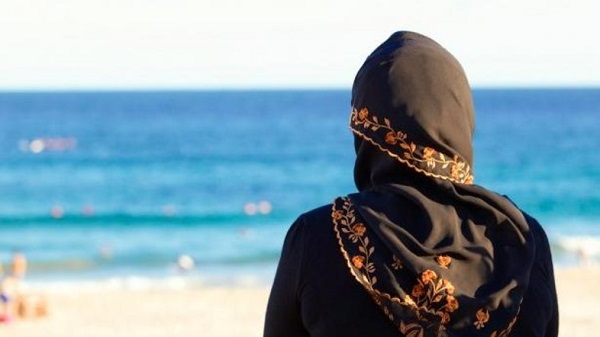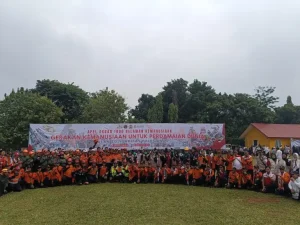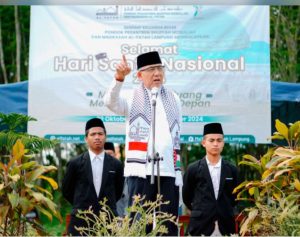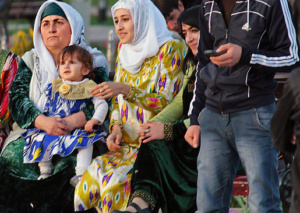Allah Subhanahu wa Ta’ala says:
يَٰٓأَيُّهَا ٱلنَّاسُ إِنَّا خَلَقْنَٰكُم مِّن ذَكَرٍ وَأُنثَىٰ وَجَعَلْنَٰكُمْ شُعُوبًا وَقَبَآئِلَ لِتَعَارَفُوٓا۟ ۚ إِنَّ أَكْرَمَكُمْ عِندَ ٱللَّهِ أَتْقَىٰكُمْ ۚ إِنَّ ٱللَّهَ عَلِيمٌ خَبِيرٌ
“O people! Indeed, We created you from a male and a female, then We made you into nations and tribes so that you might know one another. Verily, the most honorable of you in the sight of Allah is the one who is most pious. Indeed, Allah is All-Knowing, All-Aware.” (Surah Al-Hujurat 49:13).
When explaining the verse above, Imam As-Sa’di explained, Islam strictly forbids any discrimination against others. The prohibition includes giving different treatment because of differences in ethnicity, race, nation, gender, skin color, social status, and others.
Also Read: Prophet Sulaiman Alaihi Salam, the Greatest Muslim King of All Time
One of the missions of Islam in building civilization is to elevate the status of women. Islam places women as noble beings, elevating them to a high degree by giving them freedom, honor and personal rights independently.
Allah Ta’ala created women and their beauty. Beauty is not only judged from the physical, but also the heart and mind. Like jewelry, women must be cared for, protected and guarded from exploitation and humiliation.
As a religion of humanity, Islamic teachings cover all aspects of life and life. Islam appreciates the principles of human rights. Respect and appreciation for humanity is the main teaching in Islamic law.
Women in the Pre-Islamic Era
Also Read: Imaam Yakhsyallah Mansur: Surah At-Tin Indicates the Command to Liberate Al-Aqsa
British historian, Sue Blundell in her book “Women in Ancient Greece” wrote, in Greek times, men considered women as a source of disaster and disease. Women are positioned as the lowest creatures. They regard women as dirt, slaves or merchandise.
Meanwhile, Thomas A. J. McGinn in the book “Prostitution, Sexuality, and the Law in Ancient Rome” states, in Roman civilization, women were under the rule of their fathers. After marriage, the power shifts to the husband who can sell, expel, abuse, and even kill him.
In the era of ancient Egypt, the birth of a girl was considered a disgrace and a sign of bad luck, as happened in the ignorant Arab society where there was a tradition of burying baby girls alive out of shame.
In China, from the Han Dynasty (206 BC-220 AD) to the semi-contemporary era, the Chinese rulers practiced a patriarchal system. Patriarchy is a social and philosophical system that considers men to be superior to women.
Also Read: Imaam Yakhsyallah: Nurture Love for the Prophet, One Will Be with Whom One Loves
In the Indian tradition, historian Renate Syed of Ludwig-Maximillian University in Munich wrote the book, “Ein Unglück ist die Tochter” (Unfortunately Girls), he wrote, “Women have always been seen as belonging to men. Only men are considered as beings who have wisdom. Women are considered unwise. Because of that, people think women should be watched over by men.”
Meanwhile, according to Jewish belief, women are cursed creatures. They believe, it was women who caused Adam to violate Allah’s prohibition until he was expelled from heaven. Even some groups of Jews consider a father has the right to trade his daughter. When a wife earns income, then it will be the right of the husband’s family. This terrible situation continued until the sixth century AD.
Women in Islamic Shari’a
Islam came to end the oppression of women. Islam provides opportunities for women to regain honor and glory. Women have the opportunity to build a household, have a husband and children in the auspices of a complete family.
Also Read: Friday Sermon: Emulating the Firmness of the Prophet in Struggle
Based on the prophetic date, women are given the freedom to own property, carry out buying and selling transactions, give and receive grants, to get a fair share in the distribution of inheritance.
Islam also protects women’s lives by fighting the tradition of burying girls alive as a reflection of hatred against them.
As proof that Islam gives honor and glory to women, Allah has commanded respect for both parents, especially mothers, as He says: “And We command humans to do good to their parents. His mother had conceived him with difficulty, and gave birth to him with difficulty.” (Surat al-Ahqaf: 15)
From the verse above, Allah Subhanahu wa Ta’ala reminds the tiring struggles that are carried out by mothers. That is why Allah emphasizes more respect for mothers. He specifically mentions in more sentences than father.
Also Read: Imaam Yakhsyallah: Muslims Unity as Key to Victory of Islam
Meanwhile, in many hadiths, the Prophet emphasized the respect and glory of a woman. In his words, “Be devoted to your mother (first) because indeed there is heaven under her two feet.” (Narrated by Ibn Majah).
Women in Islamic Civilization
In the history of Islamic civilization, since the Prophet Muhammad until now, the role of women is inseparable, including in the fields of science, social activities, and leadership. Ibn Hajar Al-Atsqalani, in the book Al Ishabah fi Tamyiz ajh-Shahabah mentions, there are 500 women who are experts in hadith.
In the early days of the development of Islam, a woman who was so instrumental in helping the struggle for da’wah was Khadijah bintin Khuwailid, the beloved wife of the Prophet Muhammad (PBUH).
Also Read: Friday Sermon: Prophet Muhammad Is Not a Political Figure
The first person declared a martyr by the Prophet was a woman named Sumayyah bint Khayyat. She is one of the 30 people guaranteed to enter heaven as Dr Mushthafa Murad wrote in his book “30 Guaranteed People to Enter Heaven”.
In the world of military and diplomacy, history records the great role of a woman named Nusaybah Binti Kaab. She was from the Banu Najjar tribe in Medina who was famous for his bravery on the battlefield. Her name is associated with many events and battles, such as Bait-ul-‘Aqabah II, the Battle of Uhud, the Battle of Hunain, the Battle of Yamamah, and the Treaty of Hudaybiyah.
In the Battle of Uhud, Nusaybah Bint Kaab guarded and protected the Prophet Muhammad from enemy attacks. She suffered 12 arrow wounds while protecting the Prophet.
In the scientific world, the name Aisyah bint Abu Bakr is the famous hadith narrator. Aisyah is recorded to have narrated 2210 hadiths. Many scholars from among the companions and tabi’in learned from Aisyah.
Also Read: Without Knowledge, Congregation Is Merely a Crowd Without Direction
In the world of education, in the Middle Ages, there was the name Fatima Al-Fihriyah. She was a pioneer in the construction of the world’s first university, namely al-Qarawiyyin University in the city of Fez, Morocco.
In the world of Sufism and literature, there is the name of Rabiah Al-Adawiyah who is famous for her soul-stirring poems. John Renard notes in his book “Historical Dictionary of Sufism” (2005) as saying, “Rabiah is one of the few women who has consistently earned a place in hagiographic anthologies over the centuries.”
Meanwhile, in the Indonesian context, many Muslim women have inspired the struggle. There is Cut Nyak Dien who fought against the Dutch colonialism in Aceh. There was Admiral Malahayati who led 2,000 Inong Balee troops (widows of heroes) and managed to kill the leader of the Dutch troops, Cornelis de Houtman on September 11, 1599 in a head to head battle on a ship in the middle of the sea.
In Central Java, there is RA Kartini, a Muslim student of KH Sholeh Darat who with the strength of her writing is able to become an inspiration for women in various countries. Kartini’s collection of letters entitled Door Duisternis Tot Licht (After Dark Comes Light) was published in 1911, she wrote: “Our efforts have two goals, namely to contribute to the advancement of our nation and to pave the way for our sisters towards a better condition, which more commensurate with human dignity.”
Also Read: Friday Sermon: Grateful for Indonesia’s Independence by Supporting Palestine’s Freedom
Women’s Education in Islam
In the context of the right to education, Islamic teachings are very concerned about their people who seek knowledge. Many verses of the Qur’an and Hadith encourage and glorify knowledgeable people, even the law of seeking knowledge is obligatory for everyone, both men, women, children and adults. They have the same rights in obtaining access to education.
In a hadith, the Prophet said, “Seeking knowledge is the duty of every Muslim and Muslimah.” The hadith emphasizes that women have the same rights and obligations as men in seeking knowledge.
The Prophet, peace and blessings of Allah be upon him, did not prevent women from praying in congregation in the mosque. The Prophet also did not hold back the critical attitude that was raised by women who wanted to explore a problem.
Also Read: The Bestial Nature of Netanyahu
Ali Abdul Fatah in the book, “A’lam al-Mubdi’in min ‘Ulama’ Al-‘Arab wal-Muslimin” stated, a person named Khaulah bint Tsa’labah had an argument with the Prophet on religious matters. Khaulah believes that one of the rights of Muslim women is to be free to express their opinions, without being restricted. This incident was the cause of the revelation of Surah Al-Mujadilah.
Regarding the separation of men and women in the learning process, education experts in several countries said it had a significant effect on concentration and learning outcomes. Students whose classes are separated (between boys and girls) can focus more on receiving the material and get better grades than those with mixed classes.
Working Women in Islamic View
Islam has never positioned women to just stay at home without any useful activities. The Prophet Muhammad said, “The best joke of a Muslim woman in her house is weaving.” This means that women must be active and cannot be unemployed.
Also Read: Why A Mother’s Literacy Matters: Lessons from Rose Kennedy
An Egyptian scholar, Sayid Qutb said, Islam allows Muslim women to work under several conditions. She considered that there was no prohibition for women to become doctors, teachers, researchers, or community leaders. Islam allows Muslim women to work according to their abilities and feminine nature.
Professor of Al-Quran Science at Sayf al-Dawlah University (Syria), Dr. Abdul Qadir Manshur explained, Muslim women may carry out trading activities, conduct buying and selling transactions or open a business with their personal assets (capital). In buying and selling, Muslim women are allowed to show their faces and hands when choosing, taking, or giving merchandise.
Married Muslim women are allowed to work after getting permission from their husbands. For those who are not married, she gets permission from his guardian. However, the right of permission from the husband automatically expires if he does not provide for his wife.
As for the provisions that need to be considered, work does not require Muslim women to be alone with men who are not their relatives. Imam Abu Hanifah in the book Bada’i al-Shana’i said, it is forbidden to be a personal assistant for women if the boss is a man, not the mother. This prohibition takes into account the possible slander that may arise when he is alone with his superiors.
Another stipulation, while working, does not require him to dress excessively, even to reveal his genitals. This prohibition is in line with the word of Allah in Surah al-Ahzab verse 33, “Do not be adorned and behave like the ignorant people first…”
In closing this article, we quote the words of the Prophet Muhammad,
مَا أَكْرَمَ النِّسَاءَ إِلاَّ كَرِيْمٌ ، وَمَا أَهَانَهُنَّ إِلاَّ لَئِيْمٌ
“Do not honor women except those who are noble, and do not humiliate women except those who are lowly.” (Narrated by Ibn Asakir)
Wallahu a’lam bi shawab (AT/RE1)
Mi’raj News Agency (MINA)




































 Mina Indonesia
Mina Indonesia Mina Arabic
Mina Arabic